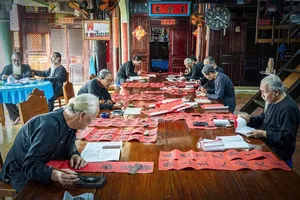
Recent online dramas involving prominent figures have captivated millions of viewers, sparking heated debates across social platforms. Beyond mere entertainment, these intrusions into personal lives have become lucrative ventures. Individuals strategically release related content like songs to capitalize on the public’s fascination, or even demand a fee from viewers before these people could see explanations and commentaries on those hot topics.
This phenomenon is not confined to domestic scandals; international controversies, such as those involving actors Kim Soo Hyun and Kim Sae Ron, resonate strongly within Vietnamese online communities.
Psychologist Dao Le Hoa An, PhD, member of the Advisory Council for youth policy and law under the National Committee on Youth of Vietnam, identifies three key drivers behind this obsession with scandal.
Firstly, the fear of missing out (FOMO) compels individuals to stay abreast of the latest controversies in an ever-shifting information landscape. Secondly, there is a perverse sense of relief derived from witnessing others’ misfortunes, reinforcing a feeling of comparative good fortune. And perhaps most significantly, there is the illusion of power.
“Engaging in online interrogations, discussions, or even attacks provides a sense of control and the illusion of judgment”, Dr. Hoa An explains. “In reality, these individuals are merely pawns in someone else’s carefully orchestrated game”.
Dr. Hoa An further cautions that these online confrontations often present a skewed or manipulated narrative, designed to sway public opinion in favor of the instigator. Viewers are easily controlled, drawn into an endless, time-consuming, and ultimately unprofitable conflict.
43-year-old Nguyen Thi Ngoc Diem from District 8 of HCMC shared that her two children, who are both secondary school students, have been attracted to such online dramas. “My greatest fear is the negative influence these stories have on young minds. The chaotic love-hate narratives peddled by online personalities erode trust in genuine relationships and civil interactions. More tragically, behaviors like infidelity and betrayal are increasingly normalized.”
Worrisome as it is, voices within the younger generation are urging social media users to disengage from these unproductive issues. 28-year-old Ho Nguyen Thanh Nhan, a software engineer living in District 7, shares that his security software group with nearly 5,000 members has consistently warned against participating in these pointless debates on social networks, which not only squander time but also amplify harmful content.
The surge in “exposures” has laid bare the toxic aspect of social media, characterized by a lack of respectful discourse. Civilized dialogue has been supplanted by public attacks and character assassination, transforming online spaces into breeding grounds for negativity and hostility.
Dr. Hoa An emphasizes the profound influence of social media on youth values. “When sensational and negative content is celebrated, it creates a distorted perception of success. Young people are tempted to chase fleeting fame through controversy, rather than investing in personal growth. Don't let fleeting curiosity turn you into a tool for drama merchants. Your worth lies in your ability to control your life, emotions, and thoughts, not in your knowledge of every online scandal”, stressed Dr. Hoa An.
A recent live stream confrontation involving account V. and two former partners, which attracted over 4.8 million viewers, exemplifies this trend. The account holder, by charging viewers to comment, profited handsomely, earning over VND40 million (US$1,550) after platform fees and an additional $3,000 in virtual gifts. This highlights the exploitative nature of these online displays.
























